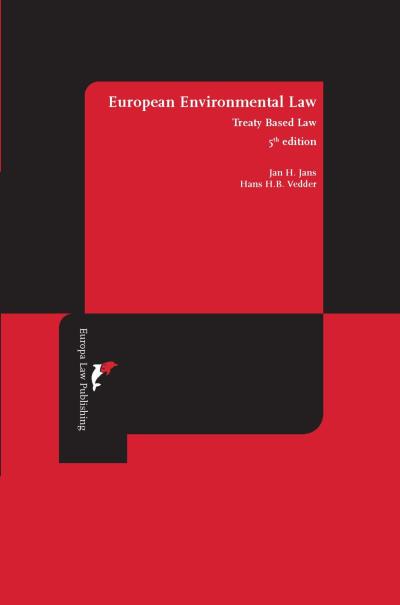This leading monograph on European Environmental Law is now completely updated and revised. This book provides an in-depth analysis of important legal issues of European environmental law. What are the legal grounds for EU environmental policy and on what principles are directives and regulations based upon? To what extent precludes EU environmental regulation more stringent national environmental standards? What are the requirements the Court of Justice has imposed on the Member States implementing environmental directives? How and to what extent can European environmental law be relied upon and challenged before national courts and the European Courts? How do the Treaty rules on the internal market and undistorted competition interfere with national environmental policy? Answers to these and other questions can be found in this book.
Prof. Jans is honorary professor of Administrative Law at the University of Groningen. Prof. Vedder is professor of Economic Law at the University of Groningen.
Preface v
Acknowledgments
Contents
Abbreviations
Chapter 1 Development and Principles
1 The Development of European Environmental Law
2 General Principles of Union Law in Relation to Environmental Protection
3 Article 191 TFEU
3.1 The Objectives of European Environment Policy
3.2 The Principles of European Environmental Policy
3.3 The Policy Aspects to be Taken into Account
Chapter 2 Legal Basis
1 Article 192 TFEU (Environment)
2 Articles 191-192 TFEU and External Relations
3 Article 114 TFEU (Internal Market)
4 Article 207 TFEU (Common Commercial Policy)
5 ‘Comitology’, Delegated Acts and Implementing Measures
6 Other Incidental Legal Bases
6.1 Article 194 TFEU (Energy)
6.2 Article 39 TFEU (Common Agricultural Policy)
6.3 The Provisions on the Common Transport Policy
6.4 Harmonisation of Indirect Taxes
6.5 Nuclear Energy and Basic Safety Standards
Chapter 3 Harmonisation
1 General Remarks
2 The Scope of Harmonisation
3 Total Harmonisation
3.1 General Remarks
3.2 Derogation Precluded
4 Minimum Harmonisation
4.1 General Remarks
4.2 Article 193 TFEU in More Detail
5 Derogation ex Article 114(4-6) TFEU
5.1 General Remarks
5.2 Maintaining or Introducing National Provisions
6 Inherent Competence to Derogate?
Chapter 4 Implementation
1 General Remarks
2 The Duty to Transpose Environmental Directives into National Law
3 Aspects of Transposition
3.1 Must Every Provision be Transposed?
3.2 Legally Binding Rules
3.3 Transposition by Means of Administrative Circulars
3.4 Transposition by Means of Environmental Agreements
3.5 ‘Transposition’ by Compliance in Fact?
3.6 Use of Different Wording in National Legislation
3.7 Transposition of Environmental Regulations?
4 Implementation by Local or Regional Authorities
5 Application and Enforcement of European Environmental Law
6 Supervision by the Commission
6.1 The Treaty Infringement Procedure
6.2 Complaints to the Commission
Chapter 5 Legal Protection
1 General Remarks
2 The Direct Effect of Union Environmental Law
2.1 Direct Effect of Provisions in Environmental Directives
2.2 Absence of Horizontal Direct Effect of Directives
2.3 Consequences of Direct Effect: Integral Application of Union Law
3 The Doctrine of Consistent Interpretation
4 The Significance of Francovich for Environmental Law
4.1 The Breach Must be Sufficiently Serious
4.2 Conferring Rights on Individuals
4.3 Direct Causal Link
5 Access to Justice
5.1 The Principle of Effective Judicial Protection
5.2 Procedural Autonomy
5.3 The Importance of the Aarhus Convention and the Aarhus Directive 2003/35
5.4 Legal Protection under Article 263 TFEU
5.5 Regulation 1367/2006 (‘Aarhus Regulation’)
Chapter 6 Free Movement of Goods
1 General Remarks
2 Environmental Charges and Article 30 TFEU
3 Article 110 TFEU
4 Non-Tariff Restrictions and Protection of the Environment
4.1 The Scope of Application of Article 34 TFEU
4.2 The Scope of Application of Article 35 TFEU
4.3 Justifications under Article 36 TFEU
4.4 The Rule of Reason and Environmental Protection
4.5 Non-Economic Grounds Only
4.6 The Proportionality of the Measure
Chapter 7 Environment and Competition
1 General Remarks
2 The Fundamentals of EU Competition Law
2.1 Market Definition
2.2 The Concept of an Undertaking
3 Article 101 TFEU
3.1 Why Environmental Agreements Exist and Restrict Competition
3.2 Article 101(1) TFEU
3.3 Article 101(3) TFEU
4 Article 102 TFEU
5 Merger Control
6 The Useful Effect Doctrine
6.1 Public-Private Hybrids
6.2 Competition Law Responsibility
7 Article 106 TFEU
7.1 Article 106(1) TFEU and Environmental Protection
7.2 Article 106(2) TFEU and Environmental Protection
8 State Aid and Articles 107 and 108 TFEU
8.1 Why There is Environmental Aid and Why it Distorts Competition
8.2 The Scope of Article 107(1) TFEU
8.3 Application of Article 107(2) and (3) TFEU to Environmental Aid
9 Conclusions
Literature
Table of Cases
Index

